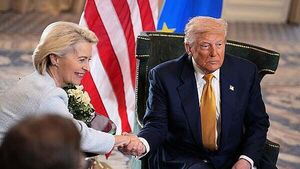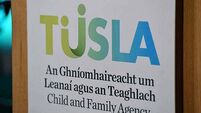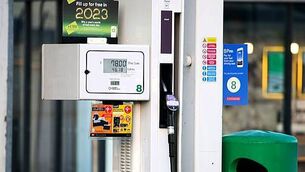'It is a terrible deal': UCD economist says EU was 'robbed' in US negotiations

Kenneth Fox
The EU-US deal confirmed earlier this week was "terrible" and the trading bloc was "robbed" during negotiations, according to a professor of economics at University College Dublin (UCD).
On Sunday, the United States and the European Union agreed to a trade deal setting a 15 per cent tariff on most goods, staving off higher import taxes on both sides that might have sent shockwaves through economies around the world.
While the overall reaction to the deal has been positive — with the Taoiseach saying it "avoided a damaging trade war" — others have been more critical of the agreement.
Speaking to BreakingNews.ie, UCD professor of economics, Ronald Davies said the EU gave in too easy to Donald Trump.
"Essentially, Trump said: 'Give me your wallet and your car’. We gave him the car.
“So, yeah, we got to keep the wallet, but we still got robbed."
Prof Davies said people can paint it as it could have been worse, "but this was in no way a deal: we got mugged."
He claims Ursula von der Leyen should have initiated a trade war with Trump as "he is somebody that only respects force, to the extent he respects anything."
"People can have differing opinions on what the better approach is. I think Europe needs to cut the US out entirely," he said.
Prof Davis thinks the EU should reorganise their supply chains and bypass the US entirely.
"What I'm saying is, if progress is going to be made on a global scale, it is got to be Europe, working with China or working with Latin America."
While that may seem extreme, I asked him whether he thinks it is worth renegotiating with a possibly less unpredictable Democrat administration in four years.
His outlook was quite bleak: "The reason why it does not matter is that the US is fundamentally broken.
"You can tell by the accent where I grew up, right? I've been in Ireland for nearly 20 years now. I think it's just going to be this pendulum swinging back and forth.
"In terms of its own domestic, internal policies, the US will make no progress. Every incoming administration is just going to try to undo what the last one did, and whatever they achieve is going to be undone by the next."
In terms of how the deal will impact the European single market, being part of a globalised world complicates things.
"This deal is going to have an impact on European consumers," he said, noting half of what the US imports are intermediate inputs from other countries, including Europe.
"60 per cent of what Europe imports are intermediate inputs, including what we get from the US. The idea that we are not adding the tariff and therefore not going to have higher prices, while being part of global supply chains, does not work."
In 2024, Irish exports to the United States totalled $78.61 billion (€67.45 billion), with pharmaceutical products accounting for $33 billion or 42 per cent of all exports.
How the deal will impact Irish businesses overall depends on the sector in question.
Elastic products

"So, the question is, okay, if prices go up by 15 per cent, how much are (US) consumers going to buy for something like alcohol?
He described it as an elastic product, so if Irish whiskey is more expensive, consumers might switch to scotch or Kentucky bourbon because there is only a 10 per cent tariff on it.
“That is something where people actually have the ability to move to a different product easily or cut back.
“Something like dairy or butter, that is also one that I think is probably fairly elastic too." He has concerns about the Irish agri-food sector and how there could be a drop in demand for Irish produce as a result.
Meanwhile, for pharmaceuticals, it is a different story. "If you cannot get your usual drug. What's the next best option? A lot of the time, there is not one.
"Ireland is the leading producer of Viagra, you know, if you cannot get your magic blue pill, what's the next best option?"
The long-term outlook makes for grim reading, with tariffs likely to add to the already skyrocketing cost of living.
"This is not going to be good. We will sort of bump along for a while until things even out. But, you know, it is a trade war and make no mistake, we are in a trade war.
“We just kind of surrendered. There is also the Russian-Ukraine war, there is an impending AI war. It is going to be a turbulent decade," he said.
"They are saying, 'Okay, this is a crap deal, but it's 15 per cent; we know what's going on. Now let's get on with things'."
In terms of how quickly we can expect to see the impact of the deal on prices, there will be some lag.
"It will take a while. Even in the US, where they have had the tariffs, at some level, they have not seen prices go up as fast as one might expect.
"That is because there is a lot of drawing down of stockpiles in place before tariffs kicked in. Come autumn, those stockpiles are going to be largely evaporated. That is when the US will start to see prices rise," he said.
For Europe, Davis reckons it will be hard to pinpoint when exactly we could see the impact, but as winter comes along and rising energy costs ensue, we will likely see the real impact of this deal.




